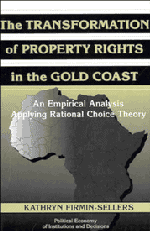 The Transformation of Property Rights in the Gold Coast
The Transformation of Property Rights in the Gold Coast Book contents
- Frontmatter
- Contents
- Series editor' preface
- Preface
- Acknowledgments
- Chapter 1 Introduction
- PART I THE INSTITUTIONS OF THE COLONIAL STATE
- PART II THE REINVENTION OF TRADITION: THE EVOLUTION OF PROPERTY RIGHTS UNDER INDIRECT RULE
- PART III THE TRANSITION TO INDEPENDENT GOVERNMENT
- Chapter 5 Redefining the institutions of central government: The writing of the Coussey Constitution
- Chapter 6 The return to the traditional state
- Chapter 7 Conclusion
- Notes
- Bibliography
- Index
Chapter 7 - Conclusion
Published online by Cambridge University Press: 08 January 2010
- Frontmatter
- Contents
- Series editor' preface
- Preface
- Acknowledgments
- Chapter 1 Introduction
- PART I THE INSTITUTIONS OF THE COLONIAL STATE
- PART II THE REINVENTION OF TRADITION: THE EVOLUTION OF PROPERTY RIGHTS UNDER INDIRECT RULE
- PART III THE TRANSITION TO INDEPENDENT GOVERNMENT
- Chapter 5 Redefining the institutions of central government: The writing of the Coussey Constitution
- Chapter 6 The return to the traditional state
- Chapter 7 Conclusion
- Notes
- Bibliography
- Index
Summary
This book analyzes the creation of property rights institutions in the Gold Coast Colony from 1927 to 1957. Drawing upon new institutionalist scholarship, I have argued that the transformation of property rights is an inherently political process. State actors create or manipulate political institutions to pursue their own, independent goals. Those institutions establish the framework within which individuals in society compete with one another and with the state to secure a favorable definition of property rights. The degree to which property rights are enforced is a product of the interaction between state and society. State actors cannot simply impose their preferred property rights systems upon their subjects; neither can subjects enforce property rights at a local level without the state's support.
Brought to the study of Africa, these propositions illuminate the historical origins and persistence of the continent's insecure land tenure. At the same time, they offer insights into the study of customary law and customary land tenure, and they explain the failure of the British colonial enterprise. Brought to the study of economic development and institutional creation, the propositions underscore the need to move politics to the fore in the field of political economy.
THE ORIGINS OF INSECURE TENURE
The dominant paradigms in development theory provide contrasting interpretations of the transformation of pre-capitalist land tenure systems. Liberal theorists posit that Africa's continued integration into the world capitalist system will lead to the collapse of customary land tenure.
- Type
- Chapter
- Information
- The Transformation of Property Rights in the Gold CoastAn Empirical Study Applying Rational Choice Theory, pp. 144 - 158Publisher: Cambridge University PressPrint publication year: 1996
